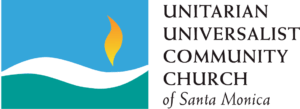
In the Fall of 2014, Ian Dodd, Len Harris, Mark Warkentin, and James Witker wrote a letter to the congregation and circulated a petition calling for a banner representing Humanism to be added to the display of religious and spiritual heritage adorning our church sanctuary. Humanism has been a part of Unitarian Universalism’s evolution over the past 100 years; in addition, they argued, its visible inclusion in our congregation’s meeting space would be a strategy for growth. The number of Americans – especially younger generations in unprecedented, explosive numbers – who have disaffiliated from traditional religious identities is surging, and the trend is projected to continue.
After popular support for the proposal from the UUSM community, the UUSM Board of Directors unanimously approved a motion to add Humanism to the sanctuary, and delegated the new banner’s design and production to the church’s AAHS (Agnostics, Atheists, Humanists, and Secularists) group. A long process followed: considering symbols and design possibilities, discerning how to come to a consensus on a final design, ensuring continuity with the existing aesthetics, and finding the right materials for production. Now that process is complete. The Humanist banner (a “Happy Human” symbol) was unveiled and presented to the congregation at services on Sunday, December 16, 2018, and hung on the wall the following week. (For implementation, the board voted to approve the Rev. Greg Ward’s idea to place the new banner where the UU flaming chalice banner had been, and to move the chalice banner to a more central position.)
Following is the dedication speech James Witker delivered to introduce the banner to the congregation.
Contrary to what some of us may have heard, Humanism is not merely a synonym for atheism. There’s much to say about its legacy as a spiritual or philosophical tradition, with roots that stretch back to the Enlightenment and early Greek philosophers such as Epicurus. Its influence in Unitarianism and Universalism in the early 20th century was revolutionary. “Humanist teachings which counsel us to heed the guidance of reason and the results of science, and warn us against idolatries of the mind and spirit” is today one of the UUA’s Six Sources.
Humanism is often defined as a progressive lifestance that, without supernaturalism, encourages us to live ethical lives of meaning and purpose that aspire to the greater good of humanity and our planet. There are two documents central to Humanist thought: the Humanist Manifesto, an evolving consensus of values, and the Universal Declaration of Human Rights. They also inform modern UUism; the idea that all people have inherent dignity and worth, theological caveats notwithstanding, is one example.
Rev. Kendyl Gibbons writes that “as a spiritual path, Humanism looks beyond the idea that a self-conscious, personal god doesn’t exist.… It is concerned with the world of human existence as it is known through human experience. It begins with the premise that our bodies and minds are the tools with which we must engage that existence, encouraging us to distinguish things as they are from things as we might wish or imagine them to be.…”
“Humanism invites us into compassionate connection with others, so that we may build the common good and, in that enterprise, make our own days glad. It offers us no assurances of divine love or a life to come, but rather the assurance that this life matters, that we create our meaning here and now, in this world.”
UU World contributor Doug Muder writes that many of us are familiar with the biblical “two great commandments”: 1. Love God and 2. Love your neighbor. He calls this sort of a two-step process favored by traditional faiths. But in a diverse, increasingly complex world, the problem is that sometimes people get can stuck on the first part. Which god? What’s the proper way to express that love, etc.? Humanism, Muder says, is the radical idea that we should start at step two: “learn how to love other people, be good to them, and treat them with respect, whether they resemble us or not, and even if they don’t necessarily believe the same things we do.”
Love your neighbor first, not second. That is Humanism at its best, perhaps – as simply as it can be explained, and a profound influence on our synergistic progressive faith movement.




